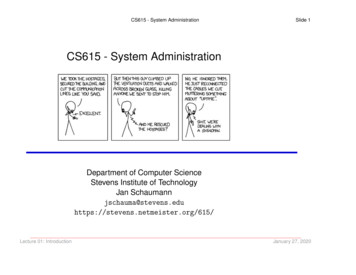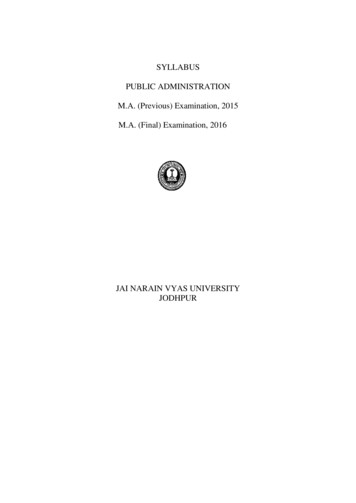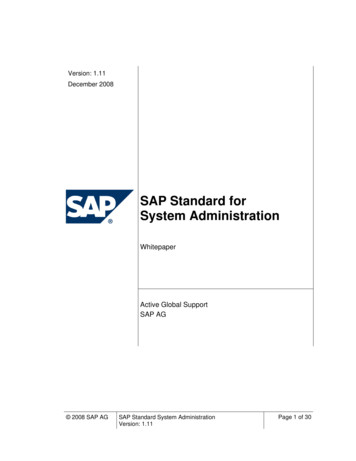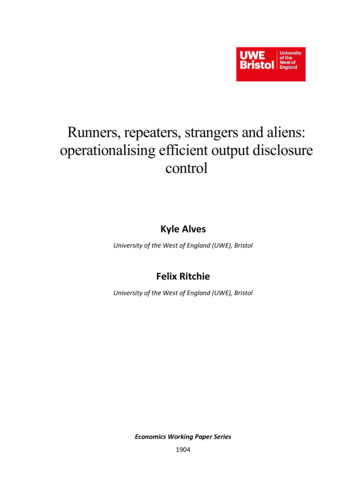CS615 - System Administration
CS615 - System AdministrationSlide 1CS615 - System AdministrationDepartment of Computer ScienceStevens Institute of TechnologyJan ister.org/615/Lecture 01: IntroductionJanuary 27, 2020
CS615 - System AdministrationSlide 2New RulesClose your laptops! (Silence phones etc.)Lecture 01: IntroductionJanuary 27, 2020
CS615 - System AdministrationSlide 3New RulesClose your laptops! (Silence phones etc.)Open your eyes!(Mind, too.)Lecture 01: IntroductionJanuary 27, 2020
CS615 - System AdministrationSlide 4The Job of a System AdministratorWhat exactly does a System Administrator do?Lecture 01: IntroductionJanuary 27, 2020
CS615 - System AdministrationSlide 5The Job of a System AdministratorLecture 01: IntroductionJanuary 27, 2020
CS615 - System AdministrationSlide 6The Job of a System AdministratorWhat exactly does a System Administrator do?https://is.gd/8vKPhlLecture 01: IntroductionJanuary 27, 2020
CS615 - System AdministrationSlide 7The Job of a System AdministratorLecture 01: IntroductionJanuary 27, 2020
CS615 - System AdministrationSlide 8The Job of a System AdministratorLecture 01: IntroductionJanuary 27, 2020
CS615 - System AdministrationSlide 9The Job of a System AdministratorLecture 01: IntroductionJanuary 27, 2020
CS615 - System AdministrationSlide 10The Job of a System AdministratorLecture 01: IntroductionJanuary 27, 2020
CS615 - System AdministrationSlide 11The Job of a System AdministratorLecture 01: IntroductionJanuary 27, 2020
CS615 - System AdministrationSlide 12The Job of a System AdministratorLecture 01: IntroductionJanuary 27, 2020
CS615 - System AdministrationSlide 13The Job of a System AdministratorLecture 01: IntroductionJanuary 27, 2020
CS615 - System AdministrationSlide 14The Job of a System AdministratorLecture 01: IntroductionJanuary 27, 2020
CS615 - System AdministrationSlide 15The Job of a System AdministratorLecture 01: IntroductionJanuary 27, 2020
CS615 - System AdministrationSlide 16The Job of a System AdministratorLecture 01: IntroductionJanuary 27, 2020
CS615 - System AdministrationSlide 17The Job of a System AdministratorLecture 01: IntroductionJanuary 27, 2020
CS615 - System AdministrationSlide 18The Job of a System AdministratorLecture 01: IntroductionJanuary 27, 2020
CS615 - System AdministrationSlide 19The Job of a System AdministratorLecture 01: IntroductionJanuary 27, 2020
CS615 - System AdministrationSlide 20The Job of a System AdministratorLecture 01: IntroductionJanuary 27, 2020
CS615 - System AdministrationSlide 21The Job of a System AdministratorLecture 01: IntroductionJanuary 27, 2020
CS615 - System AdministrationSlide 22The Job of a System AdministratorLecture 01: IntroductionJanuary 27, 2020
CS615 - System AdministrationSlide 23The Job of a System AdministratorLecture 01: IntroductionJanuary 27, 2020
CS615 - System AdministrationSlide 24The Job of a System Administratorhttp://www.opte.org/maps/Lecture 01: IntroductionJanuary 27, 2020
CS615 - System AdministrationSlide 25The Job of a System AdministratorLecture 01: IntroductionJanuary 27, 2020
CS615 - System AdministrationSlide 26The Job of a System AdministratorLecture 01: IntroductionJanuary 27, 2020
CS615 - System AdministrationSlide 27The Job of a System AdministratorLecture 01: IntroductionJanuary 27, 2020
CS615 - System AdministrationSlide 28The Job of a System AdministratorLecture 01: IntroductionJanuary 27, 2020
CS615 - System AdministrationSlide 29The Job of a System AdministratorLecture 01: IntroductionJanuary 27, 2020
CS615 - System AdministrationSlide 30The Job of a System AdministratorLecture 01: IntroductionJanuary 27, 2020
CS615 - System AdministrationSlide 31The Job of a System AdministratorLecture 01: IntroductionJanuary 27, 2020
CS615 - System AdministrationSlide 32The Job of a System AdministratorLecture 01: IntroductionJanuary 27, 2020
CS615 - System AdministrationSlide 33The Job of a System AdministratorLecture 01: IntroductionJanuary 27, 2020
CS615 - System AdministrationSlide 34The Job of a System AdministratorLecture 01: IntroductionJanuary 27, 2020
CS615 - System AdministrationSlide 35The Job of a System AdministratorLecture 01: IntroductionJanuary 27, 2020
CS615 - System AdministrationSlide 36The Job of a System AdministratorLecture 01: IntroductionJanuary 27, 2020
CS615 - System AdministrationSlide 37The Job of a System AdministratorSee also: http://is.gd/WUezLLLecture 01: IntroductionJanuary 27, 2020
CS615 - System AdministrationSlide 38The Job of a System AdministratorLecture 01: IntroductionJanuary 27, 2020
CS615 - System AdministrationSlide 39The Job of a System tape-and-wd40.htmlLecture 01: IntroductionJanuary 27, 2020
CS615 - System AdministrationSlide 40The Job of a System AdministratorLecture 01: IntroductionJanuary 27, 2020
CS615 - System AdministrationSlide 41The Job of a System AdministratorWhat exactly does a System Administrator do?Lecture 01: IntroductionJanuary 27, 2020
CS615 - System AdministrationSlide 42The Job of a System AdministratorWhat exactly does a System Administrator do?no precise job descriptionoften learned by experience“makes things run”work behind the scenesoften known as Operator, Network Administrator, SystemProgrammer, System Manager, Service Engineer, Site ReliabilityEngineer etc.system administrator n.:one who, as a primary job function, manages computer and networksystems on behalf of another, such as an employer or client.Lecture 01: IntroductionJanuary 27, 2020
CS615 - System AdministrationSlide 43A rose by any other name.Lecture 01: IntroductionJanuary 27, 2020
CS615 - System AdministrationSlide 44The Job of a System AdministratorLecture 01: IntroductionJanuary 27, 2020
CS615 - System AdministrationSlide 45So what is a System?“A group of interacting, interrelated, or interdependent elements thattogether form a complex whole.”Lecture 01: IntroductionJanuary 27, 2020
CS615 - System AdministrationSlide 46So what is a System?“A group of interacting, interrelated, or interdependent elements thattogether form a complex whole.”In the context of this class, we generally consider computer-humansystems consisting ofthe computer(s)the networkthe user(s)the organization’s goals and policiesLecture 01: IntroductionJanuary 27, 2020
CS615 - System AdministrationSlide 47The Job of a System AdministratorLecture 01: IntroductionJanuary 27, 2020
CS615 - System AdministrationSlide 48The Job of a System AdministratorLecture 01: IntroductionJanuary 27, 2020
CS615 - System AdministrationSlide 49The Job of a System AdministratorComputering, at its heart,is a people problem.Lecture 01: IntroductionJanuary 27, 2020
CS615 - System AdministrationSlide 50Choose lLecture 01: IntroductionJanuary 27, 2020
CS615 - System AdministrationSlide 51. and Administration?Merriam Webster:administer, v: to manage or supervise the execution, use, orconduct ofLecture 01: IntroductionJanuary 27, 2020
CS615 - System AdministrationSlide 52. and Administration?Merriam Webster:administer, v: to manage or supervise the execution, use, orconduct ofSystem Administration frequently also includes other tasks such assystem design and architecturereliability studiesresource managementsystem fault diagnosis.all of which my involve a fair amount of software development,programming and scripting.Lecture 01: IntroductionJanuary 27, 2020
CS615 - System AdministrationSlide 53Learning System AdministrationSystem Administration is a profession with no fixed career path.few degree granting programsheavy reliance on practical experiencespecializations in many different areas possiblebreadth of expertise as necessary as depth in some areasbackground knowledge and requirements varyLecture 01: IntroductionJanuary 27, 2020
CS615 - System AdministrationSlide 54Learning System AdministrationBreadth of knowledge:operating system conceptsTCP/IP networkingprogrammingcloud computing.Depth of knowledge:certain OS flavorspecific service (DNS, E-Mail, Databases, Content-Delivery, .)specific implementation/vendor (Oracle, Hadoop, Apache, Cisco, .)specific are of expertise (security, storage, network, data center, .).Lecture 01: IntroductionJanuary 27, 2020
CS615 - System AdministrationSlide 55People think the internet looks like this.Lecture 01: IntroductionJanuary 27, 2020
CS615 - System AdministrationSlide 56Or like this.http://www.opte.org/maps/Lecture 01: IntroductionJanuary 27, 2020
CS615 - System AdministrationSlide 57SysAdmins know it looks like this.Lecture 01: IntroductionJanuary 27, 2020
CS615 - System AdministrationSlide 58SyllabusDates and Topics subject to change:01/27: Introduction, UNIX history and basics02/03: Filesystems and Disks02/10: Software Installation Concepts02/17: Multi-user basics02/24 - 03/02: Networking03/09 - 03/23: DNS, SMTP, HTTP, HTTPS03/30: Writing System Tools04/06: Monitoring, Backup and Disaster Recovery04/13: Configuration Management04/20: System Security04/27: Ethics and Social ResponsibilityLecture 01: IntroductionJanuary 27, 2020
CS615 - System AdministrationSlide 59GradingYou are responsible for your work.Know when assignments are due!Grading:course participation, questionnaires, course notesteam missionhomework assignmentsgroup project(s)Team missions, discussions, announcements 615asaLecture 01: IntroductionJanuary 27, 2020
CS615 - System AdministrationSlide 60GradingYou are responsible for your work.There are no make-up assignments, no extra credit work at the end ofthe semester.Allocate your time wisely. If medical or family emergencies arise, contactme ASAP, as late submissions are otherwise not allowed.Lecture 01: IntroductionJanuary 27, 2020
CS615 - System AdministrationSlide 61Course Notescreate a git repository with a single text file for each lecturebefore each lecture, note:what you readwhat questions you haveafter each lecture:answers you’ve found, or especially interesting new things youlearnedwhat questions remainwhat new questions arosewhat additional reading might be relevantat the end of the semester, submit all your es.htmlLecture 01: IntroductionJanuary 27, 2020
CS615 - System AdministrationSlide 62Course NotesLet’s set up git real ecture 01: IntroductionJanuary 27, 2020
CS615 - System AdministrationSlide 63Hooray!5 Minute BreakLecture 01: IntroductionJanuary 27, 2020
CS615 - System AdministrationSlide 64Computer ScienceLecture 01: IntroductionJanuary 27, 2020
CS615 - System AdministrationSlide 65Three Pillars of Exceptional System DesignWe will give particular attention to these three core features:ScalabilitySecuritySimplicityLecture 01: IntroductionJanuary 27, 2020
CS615 - System AdministrationSlide 66Three Pillars of Exceptional System Design: ScalabilitySystem OverloadLecture 01: IntroductionJanuary 27, 2020
CS615 - System AdministrationSlide 67Three Pillars of Exceptional System Design: ScalabilityScaling VerticallyLecture 01: IntroductionJanuary 27, 2020
CS615 - System AdministrationSlide 68Three Pillars of Exceptional System Design: ScalabilityScaling HorizontallyLecture 01: IntroductionJanuary 27, 2020
CS615 - System AdministrationSlide 69Three Pillars of Exceptional System Design: ScalabilityScaling DownLecture 01: IntroductionJanuary 27, 2020
CS615 - System AdministrationSlide 70Three Pillars of Exceptional System Design: SecurityLecture 01: IntroductionJanuary 27, 2020
CS615 - System AdministrationSlide 71Three Pillars of Exceptional System Design: SecurityLecture 01: IntroductionJanuary 27, 2020
CS615 - System AdministrationSlide 72Three Pillars of Exceptional System Design: sics.htmlLecture 01: IntroductionJanuary 27, 2020
CS615 - System AdministrationSlide 73Three Pillars of Exceptional System Design: SimplicityLecture 01: IntroductionJanuary 27, 2020
CS615 - System AdministrationSlide 74Three Pillars of Exceptional System Design: SimplicityLecture 01: IntroductionJanuary 27, 2020
CS615 - System AdministrationSlide 75Three Pillars of Exceptional System Design: SimplicityLecture 01: IntroductionJanuary 27, 2020
CS615 - System AdministrationSlide 76Learning is criticalKnow how to find answers:know how to ask questionsknow where to ask questionsread criticallyknow what you don’t know (Dunning-Kruger effect)understand what you’re doingunderstand why you’re doing itseek information exchangeLecture 01: IntroductionJanuary 27, 2020
CS615 - System AdministrationSlide 77Learning is critical“Computer Science projects are opportunities,not assignments.”Lecture 01: IntroductionJanuary 27, 2020
CS615 - System AdministrationSlide 78Learning is criticalKnow how to find answers:know how to ask questionsknow where to ask questionsread criticallyknow what you don’t know (Dunning-Kruger effect)understand what you’re doingunderstand why you’re doing itseek information htmlLecture 01: IntroductionJanuary 27, 2020
CS615 - System AdministrationSlide 79SysAdmins’ favorite LawsOckham’s Razor:“Of two equivalent theories or explanations, all other thingsbeing equal, the simpler one is to be preferred.”Lecture 01: IntroductionJanuary 27, 2020
CS615 - System AdministrationSlide 80SysAdmins’ favorite LawsOckham’s Razor:“Of two equivalent theories or explanations, all other thingsbeing equal, the simpler one is to be preferred.”2nd Law of Thermodynamics:“The entropy of an isolated system always increases with time.”Lecture 01: IntroductionJanuary 27, 2020
CS615 - System AdministrationSlide 81SysAdmins’ favorite LawsOckham’s Razor:“Of two equivalent theories or explanations, all other thingsbeing equal, the simpler one is to be preferred.”2nd Law of Thermodynamics:“The entropy of an isolated system always increases with time.”Hanlon’s Razor:“Never attribute to malice that which can be adequatelyexplained by stupidity.”Lecture 01: IntroductionJanuary 27, 2020
CS615 - System AdministrationSlide 82SysAdmins’ favorite LawsOckham’s Razor:“Of two equivalent theories or explanations, all other thingsbeing equal, the simpler one is to be preferred.”2nd Law of Thermodynamics:“The entropy of an isolated system always increases with time.”Hanlon’s Razor:“Never attribute to malice that which can be adequatelyexplained by stupidity.”Pareto’s Principle:“80% of consequences stem from 20% of the causes.”Lecture 01: IntroductionJanuary 27, 2020
CS615 - System AdministrationSlide 83SysAdmins’ favorite LawsOckham’s Razor:“Of two equivalent theories or explanations, all other thingsbeing equal, the simpler one is to be preferred.”2nd Law of Thermodynamics:“The entropy of an isolated system always increases with time.”Hanlon’s Razor:“Never attribute to malice that which can be adequatelyexplained by stupidity.”Pareto’s Principle:“80% of consequences stem from 20% of the causes.”Sturgeon’s Law:“90% of everything is crud.”Lecture 01: IntroductionJanuary 27, 2020
CS615 - System AdministrationSlide 84SysAdmins’ favorite LawsOckham’s Razor:“Of two equivalent theories or explanations, all other thingsbeing equal, the simpler one is to be preferred.”2nd Law of Thermodynamics:“The entropy of an isolated system always increases with time.”Hanlon’s Razor:“Never attribute to malice that which can be adequatelyexplained by stupidity.”Pareto’s Principle:“80% of consequences stem from 20% of the causes.”Sturgeon’s Law:“90% of everything is crud.”Murphy’s Law:“If it can happen, it will happen.”Lecture 01: IntroductionJanuary 27, 2020
CS615 - System AdministrationSlide 85SysAdmins’ favorite LawsOckham’s Razor:“Of two equivalent theories or explanations, all other thingsbeing equal, the simpler one is to be preferred.”2nd Law of Thermodynamics:“The entropy of an isolated system always increases with time.”Hanlon’s Razor:“Never attribute to malice that which can be adequatelyexplained by stupidity.”Pareto’s Principle:“80% of consequences stem from 20% of the causes.”Sturgeon’s Law:“90% of everything is crud.”Murphy’s Law:“If it can happen, it will happen.”Throw in some philosophy for good measure:Causality: For every effect, there must be a cause.Lecture 01: IntroductionJanuary 27, 2020
CS615 - System AdministrationSlide 86UNIX HistoryLecture 01: IntroductionJanuary 27, 2020
CS615 - System AdministrationSlide 87UNIX historyhttps://is.gd/TUOAB2Originally developed in 1969 at Bell Labs by Ken Thompson andDennis Ritchie.1973, Rewritten in C. This made it portable and changed the historyof OS1974: Thompson, Joy, Haley and students at Berkeley develop theBerkeley Software Distribution (BSD) of UNIXtwo main directions emerge: BSD and what was to become “SystemV”Lecture 01: IntroductionJanuary 27, 2020
CS615 - System AdministrationSlide 88Notable dates in UNIX history1984 4.2BSD released (TCP/IP), 1986 4.3BSD released (NFS)1991 Linus Torvalds starts working on the Linux kernel1993 Settlement of USL vs. BSDi; NetBSD, then FreeBSD arecreated1994 Single UNIX Specification introduced1995 4.4BSD-Lite Release 2 (last CSRG release); OpenBSD forkedoff NetBSD2000 Darwin created (derived from NeXT, FreeBSD, NetBSD)2003 Xen; SELinux2005 Hadoop; DTrace; ZFS; Solaris Containers2006 AWS (”Cloud Computing” comes full circle)2007 iOS; KVM appears in Linux2008 Android; Solaris open sourced as OpenSolarisLecture 01: IntroductionJanuary 27, 2020
CS615 - System AdministrationSlide 89Notable dates in UNIX history2010 Systemd2011 Chrome OS; rise of Microservices2013 Docker2014 Kubernetes2016 Windows Subsystem for Linux.Lecture 01: IntroductionJanuary 27, 2020
CS615 - System AdministrationSlide 90Some UNIX versionsMore UNIX (some generic, some trademark, some just unix-like):1BSD4.4BSD Lite 2AIX PS/2AMiXAtari UnixBSD/386CoherentDigital UnixFreeBSDHP-UX BLSIRIXMac OS X ServerMinixMontereyNeXTSTEPOpenServerPC/IXQNX RTOSRISC iXSCO Xenix System V/386SPIXTrusted XenixUltrix 32MUNICSUNIX System VUNIX System V/386VenixLecture 01: Introduction2BSD386 BSDAIX/370AOS LiteBOSBSD/OSCTIXDragonFly BSDGNUIBM n 9QNX/NeutrinoRTSecurity-Enhanced LinuxSunOSTSUltrix-11UNIX 32VUNIX System V Release 2UNIX Time-Sharing SystemWollogong3BSDA/UXAIX/6000AOS RenoBRL UnixCB UnixDarwinDynixGNU-DarwinIBM IX/370LitesMERTMIPS OSmt XinuOpen DesktopOS/390 OpenEditionPWBQUNIXSCO UNIXSinixTru64 UnixUCLA LocusUnicosUNIX InteractiveUNIX System V Release 3UnixWareXenix OS4BSDAcorn RISC iXAIX/ESAArchBSDBSD Net/1ChorusDebian GNU/HurdDynix/ptxHPBSDInteractive 386/ixLSXMicroBSDMirBSDMVS/ESA OpenEditionOpen UNIXOS/390 UnixPWB/UNIXReliantUnixSCO UnixWareSinix ReliantUnixTrusted IRIX/BUCLA Secure UnixUnicos/mkUNIX System IIIUNIX System V Release 4UNSWXinu4.4BSD Lite 1AIXAIX/RTASVBSD Net/2Chorus/MiXDEC OSF/1 ACPekkoBSDHP-UXInteractive ISMac OS XMini UnixMk LinuxNetBSDOpenBSDOSF/1QNXRhapsodySCO XenixSolarisTrusted SolarisUltrixUnicox-maxUNIX System IVUNIX System V/286USGxMachJanuary 27, 2020
CS615 - System AdministrationSlide 91UNIX EverywhereToday, your desktop, server, cloud, TV, phone,watch, stereo, car navigation system, thermostat,door lock, etc. all run a Unix-like OS.Lecture 01: IntroductionJanuary 27, 2020
CS615 - System AdministrationSlide 92UNIX EverywhereToday, your desktop, server, cloud, TV, phone,watch, stereo, car navigation system, thermostat,door lock, etc. all run a Unix-like OS.with all the risks that entails.Lecture 01: IntroductionJanuary 27, 2020
CS615 - System Adminis
CS615 - System Administration Slide 53 Learning System Administration System Administration is a profession with no fixed career path. few degree granting programs heavy reliance on practical experience specializations in many different areas possible breadth of expertise as necessary as depth in some areas background knowledge and .
Sharma, R.D.: Advanced Public Administration Rumki Basu: Public Administration-Concept and Theories Albert Lepawski: Administration Mohit Bhattacharya: Public Administration : Structure, Process and Behaviour PAPER II COMPARATIVE PUBLIC ADMINISTRATION Unit 1 : Comparative Public Administration : Concept, Nature, Scope,
About BIRT iHub System Administration Guidev About BIRT iHub System Administration Guide BIRT iHub System Administration Guide includes the following chapters: About BIRT iHub System Administration Guide. Provides an overview of this guide, Actuate BIRT iServer documentation, and the typographical conventions in this book. Part 1. Architecture .
3 The System Administration Standard at a Glance The topic System Administration describes how all SAP technology must be administered to run a customer solution efficiently. Administration tasks are mainly executed locally, but can be accessed and triggered from a central administration system. This allows a unified access to all SAP technologies.
Public Administration: Concepts and Theories by Rumki Basu 18. Public Administration by Avasthi and Maheshwari 19. Public Administration: A New Paradigm by Ali Ashraf and S.N. Mishra 20. Public Administration in India by Padma Ramachandran 21. Fifty Years of Indian Administration: Retrospect and Prospects by T.N. Chaturvedi 22. Case Studies in Administrative Environment and Decision Making by .
Rumki Basu: Public Administration. 3. Hoihiar Sir and Pradeep Sachdeva, Administrative: Theory. 4. C.P. Bhambhari : Public Administration 5. M.P. Sharma and B.L. Sadna, Public Administration in Theory and Practice. SINGHANIA UNIVERSITY Detailed Syllabus of B A (Public Administration) (Effective from session 2016-17 onward) -----B. A. 1st, 2nd & 3rd Year (Public Administration) Page 53 BPAD 102 .
Chapter 6: Public Administration in the Age of Globalization and Liberalization BOOKS FOR REFERENCE A.Avarthi and S.R.Maheswari - Public Administration Mohit Bhattacharya - Public Administration A.R,Tyagi - Public Administration C.P. Bhambri - Public Administration Dr. Rumki Basu - Public Administration
Administration, Master of Business Administration in Executive Leadership, Master of Business Administration in Finance, Master of Business Administration in HealthCare Administration, Master of Business Administration in Human Resources, Management degree and Master of Science in Sport programs.
Zrunners-repeaters-strangers-aliens [ (RRSA) (Parnaby, 1988; Aitken et al., 2003). This model segments inputs of demand from customers (in this case, the requests from researchers for data cleared for publication) and uses the different characteristics of those segments to develop optimal operational responses. Using this framework, we contrast how the rules-based and principles-based .























